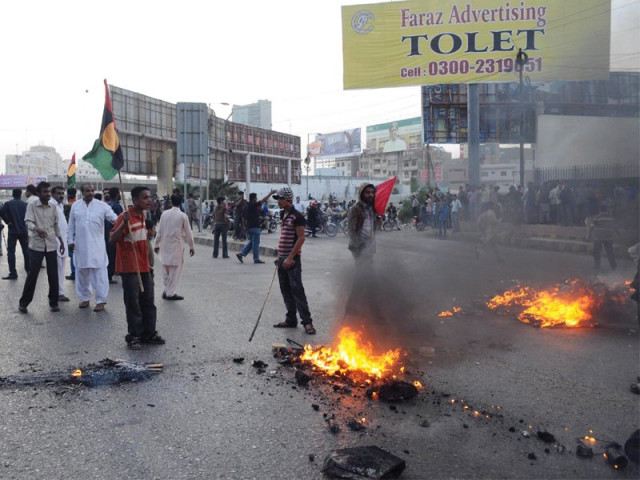Rental power case aftermath: Karachi and other cities light up with burnt tyres
When SC’s orders for the arrest of the PM came in, protesters blocked the city’s streets.

Several young men blocked Sharae Faisal on Tuesday evening and burnt tyres to protest the Supreme Court’s decision to arrest the prime minister. PHOTO: MOHAMMAD NOMAN/EXPRESS
It took a couple of hours for the shockwaves generated by the gavel at the end of the rental power case hearing in Islamabad to reach Sindh. But when they did, bullets flew skywards and shutters slid hastily in the opposite direction.
Enraged by the apex court’s orders on Tuesday for the arrest of Prime Minister Raja Pervaiz Ashraf, armed men came out onto Karachi’s roads and littered them with burnt tyres.
Amidst the protests and gunfire, the rumour mill began to spin - there were talks about dissolution of assemblies and possible emergence of men in khaki from the barracks. Preempting the worst, some of the city’s residents made a beeline for utility stores to stock up on ration. As they did, the arteries of the city were clogged with an assortment of buses, cars, motorcycles, ambulances and police mobiles.
“It usually takes me 20 minutes to get home, but today it took me two hours,” said Wakeel Sheikh, a jeweler in Saddar. “You never know when things might get ugly, when something horrible might go down. I think now is the time to stock up on food.”
Most of the action was confined to some spots of the city, including MA Jinnah Road near Jama Cloth Market, Drigh Road, Gulshan-e-Hadeed, Sharae Faisal, Pehlwan Goth, Sacchal Goth, Mauripur, Landhi, Malir and Quaidabad. It was in these areas that rings of fire were seen on the street and the unpleasant odour of burnt rubber permeated the air. The protesters also blocked the Super Highway, National Highway and Northern Bypass.

The protests also paralysed businesses in parts of the city - shopkeepers and petrol pump managers closed shop at the first signs of trouble. All Pakistan Tajir Ittehad’s chairperson, Atiq Mir, was red-faced too, though for reasons much different than the protesters. “Nobody is bursting with joy to close shop,” he told The Express Tribune. “Instead of falling one by one, I wish the government would just go in one swoop and be replaced by new, good leaders.”
Sindh police’s spokesperson, Imran Shaukat, told The Express Tribune that law enforcers across the province have been put on red alert to prevent the situation from spiraling out of control. “If someone wants to protest, they can go to the press club and we won’t stop them. But they won’t be allowed to carry on protesting as they are now.”
Pakistan Peoples Party leader Sohail Abidi said that the protests were being held to express solidarity with its leaders. He hastened to add that the party itself had not given any call for protests. “These people are protesting of their own free will. We didn’t tell anyone to come out onto the roads and do what they are doing.”
Hot and cold
In other parts of the province, the reaction to the apex court’s order was mixed, with some cities coming to a complete standstill and others bustling with daily activity.
In Larkana, a mob thundered along Bandar Road, shouting slogans against the decision. At other places in the district, there were reports that armed men brandished weapons in front of the police in broad daylight and coerced shopkeepers into calling it a day. Law enforcers stood inconspicuously on the sidelines.
More of the same happened in Shaheed Benazirabad, Moro, Dadu and Jacobabad, where armed men roaming the streets sporadically punctuated the silence by firing shots into the air. In Khairpur, the hometown of the chief minister, men carrying guns and wooden sticks went around telling shopkeepers to pack up or face the consequences. But as soon as the mobs passed through the area, the shutters flew up again.
The reaction in Hyderabad was quite mixed, with some parts of the city, including Saddar, Bohri Bazaar and Qasimabad, paralysed while at other places, it was business as usual.
Rohri, Ghotki, Mirpur Mathelo, Daharki, Ubauro, Thull and Shikarpur were, however, relatively free from commotion.
Published in The Express Tribune, January 16th, 2013.



















COMMENTS
Comments are moderated and generally will be posted if they are on-topic and not abusive.
For more information, please see our Comments FAQ